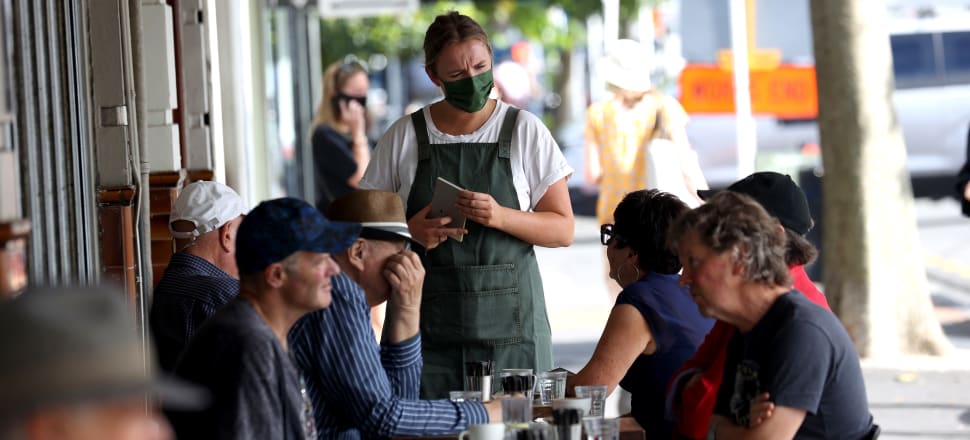
The restaurant industry lobby group says just two in five eateries responding to a survey on Covid-19 protocols plan to make infected staff stay home for five days in line with health advice.
A snap poll of Restaurant Association members conducted after the Government scrapped mandatory isolation for Covid-19 cases suggests most don't have virus protocols in place.
According to the industry group, just 39 percent say they will mandate a five-day isolation period for employees with Covid, and 42 percent say they will make symptomatic staff take a test before coming to work.
The new health advice from the Government is that people should isolate for five days from the day they tested positive, although it is no longer a legal requirement.
READ MORE: * Tourism's faltering recovery relies on foreign workers * The reason menu broker Zomato has quietly exited NZ
Restaurant Association chief executive Marisa Bidois says the numbers are just "an initial response".
"The survey was a snap poll of our members conducted the day the change in guidelines occurred. It asked whether they intended to mandate a five-day isolation period and this was an initial response. Many are looking at other ways to ensure that this is managed in their businesses, some are opting for longer stand-down periods and others will refer to their Food control plans to outline any stand-down. It is early days and is being worked through," she says.
"The key here is around mandating. The Government is recommending and not mandating it, so, members aren’t mandating it either but that’s not saying they won’t have recommendations in place with staff, and it’s not saying we wouldn’t be looking to manage it."
Bidois adds the association will itself issue guidelines to the industry to follow the five-day isolation recommendation.
On testing, she says businesses will not allow symptomatic employees to come to work.
"The usual rules of sickness apply – stay home until well enough to return to work – but without the requirement for testing. This came through strongly in the survey comments, that existing sickness policy enforces ‘stay home if you are sick’. Our businesses are obligated to operate under the guidelines of the Food Act which makes a food control plan mandatory," she says.
"When talking about managing sickness within the context of a Food Control Plan or any food business, an essential component of this is to ensure that sick staff members do not contaminate food and put consumers at risk. Here's how sickness is generally managed."
It is not fully clear how this aligns with the wording used in the original statement from the association on the survey results, in which it reported only 42 percent of respondents "plan to require employees with symptoms to undergo testing before returning to work".
Health experts have long pointed to restaurants and bars as hotspots for Covid-19 transmission, because few people are masked and they tend to be crowded indoor environments. A study by the US CDC in 2021 during the acute phase of the pandemic found Covid-19 death rates rose in places where indoor dining had been permitted, as compared to those where it was still barred.
University of Otago Wellington epidemiologist Michael Baker says restaurants and bars are still among the highest risk settings for the spread of the virus.
"It's got all the classic factors, the three 'C's. Confined, crowded and close contact," he says.
He was also dismayed by the results of the survey.
"That confirms the fears that public health experts, and I think probably the public, have about the consequences of removing these controls. I can understand removing the mandates but you'd want to know what's going to replace them – because it can't be nothing," he says.
Baker suggests the Government should have worked with industries and unions ahead of the announcement to implement a code of practice for infection control measures.
"Maybe this is a little optimistic, but there's no question that isolation is important, it's maybe a question about how they are enforced. If you said to people, are you happy that the person who serves you in this restaurant might have a raging Covid infection and they know it, but they're just soldiering on anyway, I would have thought most people would say they want isolation to continue but we don't think a legal mandate is the best tool," he says.
"Or even if you're working in a tight situation like in a kitchen or in an office with people who feel it's fine to come to work sick and your employer is not laying down the law that they do not want you coming to work with symptoms or even a positive Covid test. It's about occupational health and safety and looking after customers."
Reacting to the end of mandatory isolation on Monday, other New Zealand experts also urged employers to keep sick people at home.
"Without isolation being mandated, I wouldn't be surprised if more employers now start demanding people work when unwell," University of Auckland microbiologist Siouxsie Wiles said.
Amanda Kvalsvig, an epidemiologist at the University of Otago Wellington, said the loss of Government rules puts pressure on the vulnerable.
"As in food safety and many other spheres, mandating specific health measures protects people who might be under pressure from employers or others to cut corners, helps to keep us all safe in public settings," she said.
"What is needed now is for New Zealanders to hold onto those values of keeping others safe even when Government policy is no longer aligned with those values. People with decision-making power, for example employers, can use that power to maintain workplace safety, ensuring that unwell workers are able to stay home and recover without infecting their co-workers."







